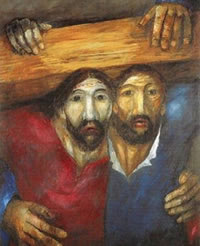
23rd Sunday in Ordinary Time Year C
From time to time we should stop and consider how momentous is the decision we have made to be a follower of Jesus. So easily we expect our Christian life to be undisturbed and unchallenged; so that it can become little more than engaging from time to time in consoling practices. We can fail to recognise that we are caught up in nothing less than the life and death struggle of the whole world. The one we are called to follow is the eternal Son of the Father, who became one of us, that through his Paschal Mystery he may lead us out of the world of selfishness and violence we have made, into a new heaven and new earth, where all is shaped by the generous and merciful ways of his Father. We should not be surprised that, as he undertakes his courageous journey to Jerusalem, his teaching has a sharp edge. It is important, however, to understand what he is asking of us, so that it will not remain little more than a seemingly impossible ideal.
Luke has Jesus giving this teaching to ‘great crowds’; it is not teaching for an elite group, but teaching that all those who call themselves his followers should take to heart. We must not be misled, of course, by the stark Semitic turn of phrase he uses. He does not tell us that we should have no love for the things most precious in our lives, our many bonds of kinship, even our own life itself. He is telling us that even these things must not be given a preference in our decisions that would amount to a renunciation of Christ and what he stands for. He is showing us the seriousness of the mysterious mission he has received from his Father, as he makes for the Holy City to take up his cross. If we are to be his true followers, we must ‘carry his cross and come after him’. Our following must not be half-hearted, his two parables tell us. We must weigh up fully the implications of our decision not to allow any consideration to destroy our commitment to him; we must be ready to carry it through to the end. Otherwise our situation will be like that of the man whose half-completed building is a monument to his foolishness; or worse, like that of the king whose lack of foresight leads him to defeat and death. In the continuation of Luke’s text, Jesus tells us that we - who are called to share in his mission to bring wholesomeness to the world - should not become like salt that has lost its taste.
The final words of the gospel are the most challenging of all: ‘none of you can be my disciples unless he gives up all his possessions’. But these very words help us to understand that Luke is not holding up to us an impossible ideal. Luke stresses the place of poverty in the Christian life; the wording of his first beatitude is blunt: ‘Happy are you who are poor’ (Lk 6:20); but what follows makes it clear that he does not expect all followers of Jesus to give up all their possessions – they are urged to ‘lend, without hope of return’ and to ‘give’ generously. What the Lord asks for is that, in our life commitments, we place all that is most dear to us in his hands, ready to accept whatever he asks of us. Some Christians, of course, receive a personal call to immediate renunciation – a reminder to us all of the seriousness of our following of Christ.
John Thornhill sm

